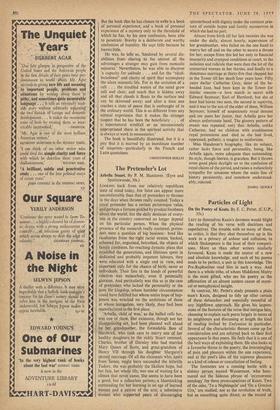The Pretender's Lot
Arbella Stuart. By P. •M. Handover. (Eyre and Spottiswoode, 308.) LOOKING back from our relatively republican state of mind today, few fates can appear more uncomfortable than that of pretenders to thrones in the days when thrones really counted. Today a royal pretender has a certain picturesque value, and perhaps a fortune pickled by prudent forebears about the world; but the daily destinies of every- one in the country concerned no longer depend on his particular person. When the physical presence of the monarch really mattered, preten- ders were a question of big business : bred like racehorses from the right racial strains, backed, schemed for, organised, betrothed, the objects of family combines, far-reaching dynastic plans that straddled the generations, and lifetimes spent in
• dedicated and probably impotent labours, they were educated with a single end in view, and important only for the chance of birth, never as individuals. Their fate in the hands of powerful relatives was melancholy, even if potentially glorious. And particularly was this so in the case of pretenders who lacked the personality or the taste for kingship, whom humbler circumstances could have fulfilled but whose entire hope of hap- piness was wrecked on the ambitions of those at whose instigation, very likely, they had been manufactured in the first place.
'Arbella, child of woe,' as the ballad calls her, was one of these. Her existence, though not her disappointing sex, had been planned well ahead by her grandmother, the formidable Bess of Hardwick, who took care to marry one of her healthy daughters to the sickly Stuart remnant, Charles, brother of Darnley who had married Mary Queen of Scots, and great-grandson of Henry VII through his daughter Margaret's second marriage. Of all the claimants who; apart from lames, might have succeeded the infertile Tudors, she was probably the likeliest hope, but her fate, her whole life; was one of waiting for a climax that never:came, She seems to have been a good, but a colourless person;1 a bluestocking outstanding for her learning in an age of learned women and a patron of the arts; a submissive woman who supported years of discouraging
spinsterhood with dignity under the constant pres- sure of outside hopes and family manoeuvres in which she had no part.
Almost from birth till her late twenties she was under the daily, almost hourly, supervision of her grandmother, who failed on the one hand to marry her off and on the other to secure a throne for her; escape from this led her only to financial insecurity and cramped conditions at court, to the isolation and ridicule that were then the lot of the unmarried woman in her thirties, and finally to a disastrous marriage at thirty-fiVe that clapped her in the Tower till her death four years later. Fifty years earlier Catherine Grey, sister of the be- . headed Jane, had been kept in the Tower for similar reasons—a love match in secret with Edward Seymour, Earl of Hertford; but she at least had borne two sons, the second in captivity, and it was to the son of the elder of these, William Seymour, himself of suspiciously royal descent and ten years her junior, that Arbella gave her always unfortunate hand. The gloomy pattern of events was repeated, only that Arbella, unlike Catherine, had no children with troublesome royal pretensions and died as she had lived, oppressed, pathetic, a magnet to misfortune.
• Miss Handover's biography, like its subject, rather lacks force and personality, being, like Arbella again, more adequate than outstanding. Its style, though literate, is graceless. But it throws some good plain daylight on to the confusion of royal claims of the period, and raises a melancholy sympathy for someone whom the main line of history persistently, and somehow understand- ably, rejected.
ISABEL QUIGLY


































 Previous page
Previous page